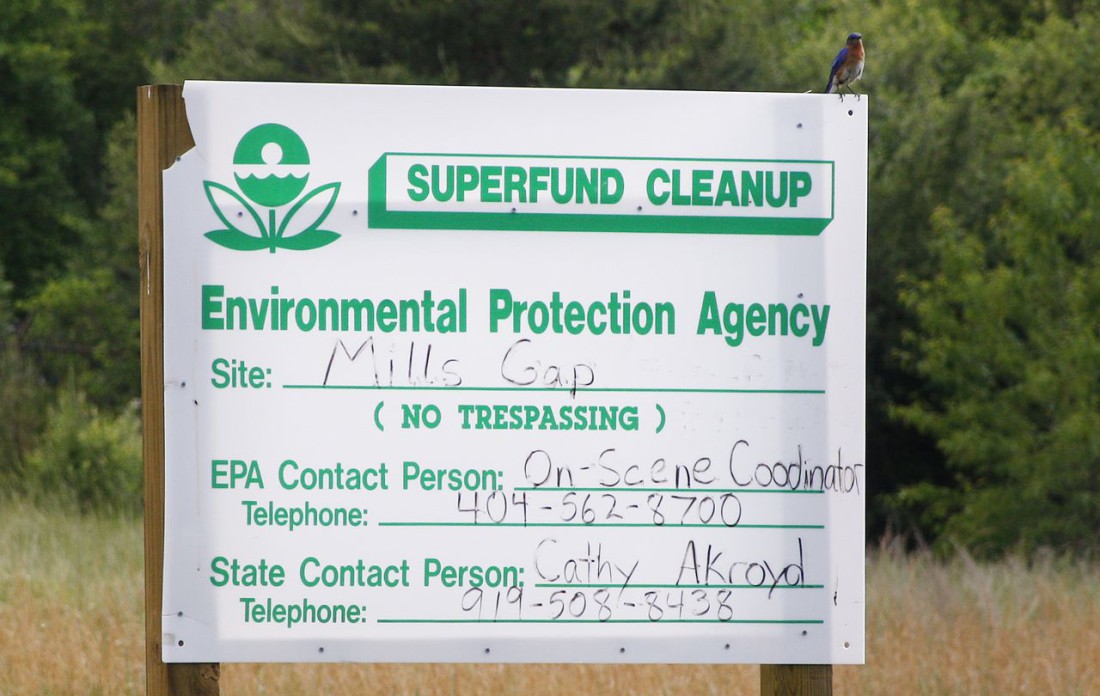Contamination from the long-closed CTS site on Mills Gap Road continues to garner national attention. The latest is “Don’t Drink the Water,” a story in The Atlantic magazine by Kevin Maurer. The story reviews the history of the contamination, from reports in 1990 to the “day the EPA showed up at [Terry Rice’s] door with bottled water” a decade later to the property’s classification as a federal Superfund site in 2012.
It also reveals the frustration and suffering that the most affected families have gone through — thyroid cancer, brain tumors, headaches and more. The Rices “feel sure it is from the [trichloroethylene] and the chemicals.”
Here are a few excerpts:
The lush thicket of trees that once hid [Terry] Rice’s house from the road is gone — the limbs are thin and bare, sticking out of the ground like crooked fingers. Less than 50 yards from his front door sits a trailer with white pipes snaking out in all directions. A chain link fence circles the vacuum-like device, which sucks deadly solvents from the soil and scrubs toxic vapors from the air. The machine sounds like a compressor steadily running 24 hours a day.
“It’s sad to look at them and how they’ve fought this thing for all these years,” said Taylor. “They thought they had a piece of property that would be valuable and sell it and move and enjoy some retirement. Their property is worth nothing.” …
“When we were able to get this land, we were so excited,” said Dot, a slender woman with graying hair who patrols her property in a golf cart. “This would be something we could leave our two sons and their children.” …
After they moved in, the Rices noticed the water coming out of the spring had a salty taste and smelled musty. When Dot used to walk the property with her husband, she could smell a sweet petroleum smell from the well and spring, especially when it rained.
“I got used to it,” Terry Rice said. “We checked for bacteria. We didn’t check for chemicals.”
The Rices never looked into the history of the CTS plant nearby, which had been operating since 1959. “We were too trusting,” Dot said. “We didn’t do our research on it. We didn’t think we had to. We had no idea what we were drinking.” …
Years after the first traces of contamination were found on the Rices’ property, it can be hard to know where to place the blame. There’s little question that CTS has consistently evaded responsibility. The Rice family settled with the company in 2005, after five years of negotiation. But a group of 25 landowners, who bought property from the developers after the CTS site closed, battled CTS unsuccessfully for years. Eventually, the company won a June 2014 Supreme Court casethat blocked victims from suing because a state law’s statute of limitations lapsed. (That law was revised after the ruling.) …
“They are supposed to be here to protect us,” Terry Rice said [of the EPA]. “The EPA has done nothing to stem the tide of disease. All they do is test, test, test and nothing to clean up the site.”
For more on the CTS case, go to http://mountainx.com/tag/cts.




Before you comment
The comments section is here to provide a platform for civil dialogue on the issues we face together as a local community. Xpress is committed to offering this platform for all voices, but when the tone of the discussion gets nasty or strays off topic, we believe many people choose not to participate. Xpress editors are determined to moderate comments to ensure a constructive interchange is maintained. All comments judged not to be in keeping with the spirit of civil discourse will be removed and repeat violators will be banned. See here for our terms of service. Thank you for being part of this effort to promote respectful discussion.